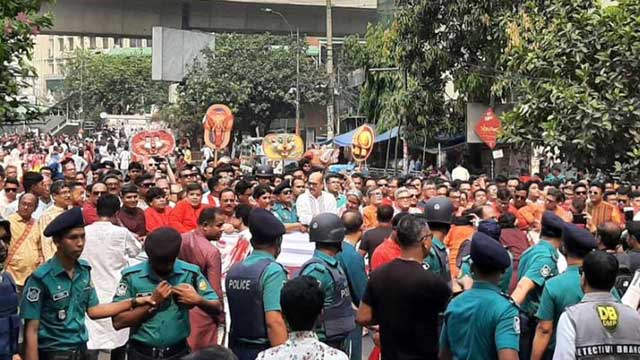Pahela Baishakh, the first day of Bengali New Year-1431, is being celebrated across Bangladesh on Sunday with festivity, upholding the rich cultural values and rituals of the Bangalees.
A huge number of people are joining the ‘Naba Barsha’ festivities across the country, particularly in the Dhaka.
On this occasion, people from all walks of life wear traditional Bengali dresses. Young women wear white sarees with red borders and adorn themselves with bangles, flowers and ‘tips’ while men wear white pyjamas and panjabi or kurta.
Different cultural organisations and educational institutions in the capital organised various programmes, including traditional music performances, recitations, colourful procession, dance recitals to mark the Bengali New Year.
Chhayanaut, Faculty of Fine Arts at Dhaka University, Wrishiz Shilpi Gosthi and other institutions and organisations arranged diverse events in the morning in the capital to mark the day.
The welcoming ceremony of Bangla New Year 1431 in Dhaka began at Ramna Batamul with the first rays of Sunday’s morning sun by Chhayanaut, a leading cultural organisation of the country.
The programme started with an instrumental performance of Ahir Bhairab raga by flautist Murtaza Kabir Murad.
Chhayanaut’s two-hour programme with the slogan ‘Dur Koro Attokendrikota, Apni Jalo Ei To Alo’ featured solo and group songs, recitations along with speeches.
Dhaka University fine arts faculty brought out traditional Mangal Shobhajatra, a colourful procession, with the slogan ‘Amra To Timirbinashi’.
This year’s procession featured five structures depicting a child, a pangolin, a decorative elephant, a decorative wheel and a bird.
The procession was cordoned by heavy security of the law enforcement agencies.
A large number of participants of the procession were holding handheld colourful masks depicting tiger, owl, elephant, fish and others.
Began on the FFA premises, the procession moved towards Shahbag intersection and taking a u-turn beside the Dhaka Club, the procession ended in front of the Teacher-Student Centre.
Mangal Shobhajatra was also brought out at divisional, district and upazila levels to reach the traditional programme to the grassroots as it has earned the international recognition. Mangal Shobhajatra was inscribed on UNESCO’s Representative List of Intangible Cultural Heritage of Humanity in 2016.
Wrishiz Shilpi Gosthi welcomed the day by organising a programme in front of Shishu Park in Shahbag area at about 7:30am. The programme featured songs, recitations, dance recitals, discussions and others.
Thespian Mamunur Rashid was present as the chief guest in the programme.
Wrishiz Shilpi Gosthi president Suraiya Alamgir presided over the event, which was moderated by the organisation’s vice-president Fakir Siraj.
They along with Swadhin Bangla Betar Kendra artiste Rathindranath Roy inaugurated the programme by releasing balloons.
Bangladesh Television, Bangladesh Betar and private television channels will live broadcast the programmes.
Business communities, especially in the rural areas, have opened their traditional ‘Halkhata’, new account books. On the day, traders also offer sweets to customers.
President Mohammed Shahabuddin and Prime Minister Sheikh Hasina issued separate messages greeting the countrymen on the eve of the Pahela Baishakh.
Different government and non-government organisations, socio-cultural platforms, including Bangladesh Shilpakala Academy, Bangladesh Shishu Academy, Bangla Academy, Department of Public Libraries, the National Museum, Kabi Nazrul Institute, Copyright Office, National Book Centre, Bangladesh Small and Cottage Industries Corporation, the Department of Archivesand Library and Dhaka University will hold various programmes along with seminars, exhibitions and quiz, essay and art competitions marking the festival.
Besides, local administration will organize quiz competitions, cultural programmes and folk fairs.
On the occasion, all museum and archaeological sites will remain open for all while children, students, people with disabilities and autism will be allowed to visit the museum free of cost.
On the occasion, improved traditional food will be distributed to jail inmates, patients in hospitals and orphanages.
Bangladesh missions abroad will also organise different programmes to welcome the Bengali New Year.
The law enforcement agencies will take extensive security measures across the country so that people could celebrate the day.
The day is a public holiday.
Bangladesh Television, Bangladesh Betar and other private TV and radio channels will air special programmes highlighting the significance of Pahela Baishakh.
Some historians attribute the Bengali calendar to the seventh century King Shashanka, which was later modified by Mughal Emperor Akbar for the purpose of tax collection.
During the Mughal rule, land taxes were collected from Bengali people according to the Islamic Hijri calendar. This calendar was a lunar calendar, and its new year did not coincide with the solar agricultural cycles.
Akbar asked the royal astronomer Fathullah Shirazi to create a new calendar by combining the lunar Islamic calendar and solar Hindu calendar already in use, and this was known as Fasholi shan (harvest calendar).





